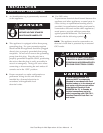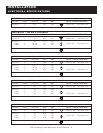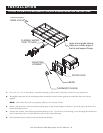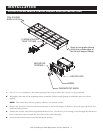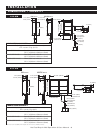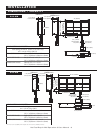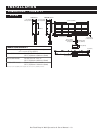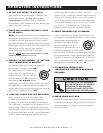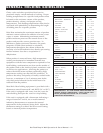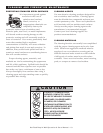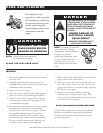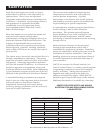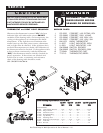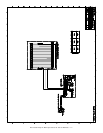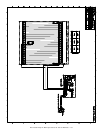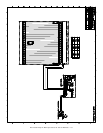
Hot Food Drop-In Well Operation & Care Manual • 12
G E N E R A L H O L D I N G GU I D E L I N E S
Chefs, cooks and other specialized food service
personnel employ varied methods of cooking. Proper
holding temperatures for a specific food product must
be based on the moisture content of the product,
product density, volume, and proper serving
temperatures. Safe holding temperatures must also be
c
orrelated with palatability in determining the length
of holding time for a specific product.
Halo Heat maintains the maximum amount of product
moisture content without the addition of water, water
vapor, or steam. Maintaining maximum natural
product moisture preserves the natural flavor of the
product and provides a more genuine taste. In
addition to product moisture retention, the gentle
properties of Halo Heat maintain a consistent
temperature throughout the cabinet without the
necessity of a heat distribution fan, thereby preventing
further moisture loss due to evaporation or
dehydration.
When product is removed from a high temperature
cooking environment for immediate transfer into
equipment with the lower temperature required for hot
food holding, condensation can form on the outside of
the product and on the inside of plastic containers used
in self-service applications. Allowing the product to
release the initial steam and heat produced by high
temperature cooking can alleviate this condition. To
preserve the safety and quality of freshly cooked foods
however, a maximum of 1 to 2 minutes must be the
only time period allowed for the initial heat to be
released from the product.
Most Halo Heat holding equipment is provided with a
thermostat control between 60° and 200°F (16° to 93°C).
If the unit is equipped with vents, close the vents for
moist holding and open the vents for crisp holding.
If the unit is equipped with a thermostat indicating a
range of between 1 and 10, use a metal-stemmed
indicating thermometer to measure the internal
temperature of the product(s) being held. Adjust the
thermostat setting to achieve the best overall setting
based on internal product temperature.
H O L D I N G T E M P E R A T U R E R A N G E
M
EAT
F
AHRENHEIT
C
ELSIUS
BEEF ROAST — Rare 130°F 54°C
BEEF ROAST — Med/Well Done 155°F 68°C
BEEF BRISKET 160° — 175°F 71° — 79°C
CORN BEEF 160° — 175°F 71° — 79°C
P
ASTRAMI
1
60° — 175°F
7
1° — 79°C
P
RIME RIB — Rare
1
30°F
5
4°C
STEAKS — Broiled/Fried 140° — 160°F 60° — 71°C
RIBS — Beef or Pork 160°F 71°C
V
EAL
1
60° — 175°F
7
1° — 79°C
HAM 160° — 175°F 71° — 79°C
PORK 160° — 175°F 71° — 79°C
LAMB 160° — 175°F 71° — 79°C
POULTRY
CHICKEN — Fried/Baked 160° — 175°F 71° — 79°C
DUCK 160° — 175°F 71° — 79°C
TURKEY 160° — 175°F 71° — 79°C
G
ENERAL
1
60° — 175°F
7
1° — 79°C
FISH/SEAFOOD
FISH — Baked/Fried 160° — 175°F 71° — 79°C
L
OBSTER
1
60° — 175°F
7
1° — 79°C
SHRIMP — Fried 160° — 175°F 71° — 79°C
BAKED GOODS
B
READS/ROLLS
1
20° — 140°F
4
9° — 60°C
MISCELLANEOUS
CASSEROLES 160° — 175°F 71° — 79°C
DOUGH — Proofing 80° — 100°F 27° — 38°C
EGGS —Fried 150° — 160°F 66° — 71°C
FROZEN ENTREES 160° — 175°F 71° — 79°C
HORS D'OEUVRES 160° — 180°F 71° — 82°C
PASTA 160° — 180°F 71° — 82°C
PIZZA 160° — 180°F 71° — 82°C
POTATOES 180°F 82°C
PLATED MEALS 140° — 165°F 60°— 74°C
SAUCES 140° — 200°F 60° — 93°C
SOUP 140° — 200°F 60° — 93°C
VEGETABLES 160° — 175°F 71° — 79°C
THE HOLDING TEMPERATURES LISTED ARE SUGGESTED
GUIDELINES ONLY. ALL FOOD HOLDING SHOULD BE BASED ON
INTERNAL PRODUCT TEMPERATURES. ALWAYS FOLLOW LOCAL
HEALTH (HYGIENE) REGULATIONS FOR ALL INTERNAL
TEMPERATURE REQUIREMENTS.



